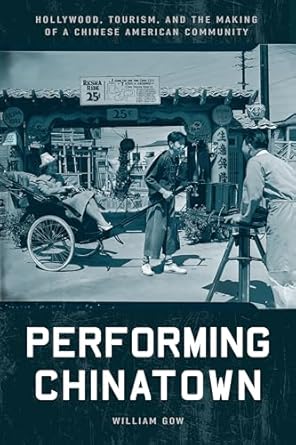The Book
Performing Chinatown
The Author(s)
William Gow

William Gow’s Performing Chinatown: Hollywood, Tourism, and the Making of a Chinese American Community is an in-depth examination of Chinese American history in Los Angeles. Drawing from an interdisciplinary approach and extensive primary sources that include oral interviews, archival collections, and family materials—this book is a powerful record of Chinese American lived experiences. [1] Such a broad array of sources allows Gow to investigate how Chinese American identities changes depending on their roles within the contexts of Hollywood, tourism, and racial performance. He divides it up into three sections.
In the first section, Gow introduces the concept of “Chinatown Pastiche,” a term he uses to describe the fusion of cultural elements—such as food, architecture, and performances—those Chinese American merchants crafted to draw tourists. [2] Gow locates the origin of this pastiche in the 1893 World’s Columbian Exposition and its ultimate fruition with the construction of New Chinatown, Los Angeles in 1938. [3] This section of the book illustrates how Chinatown was built on making it a non-threatening, exotic attraction for white tourists that simultaneously reinforced racial hierarchies in subtle ways.
The second part of the book turns to Chinese Americans in Hollywood during the Great Depression. Here, he presents a different and nuanced perspective by presenting how Chinese American actors and extras managed to make their way through that racialized context. [4] Though they were often pushed to fill out stereotypical roles, these actors and actresses also found ways to exhibit autonomy—such as negotiating for better wages and conditions. Gow’s analysis of MGM’s The Good Earth (1937) serves as a case study to demonstrate the limitations and minor victories for Chinese American performers in Hollywood. [5]
The last section discusses how Chinese American representations translate in relation to world matters of World War II. Gow complicates the narrative that Chinese Americans were suddenly elevated to a significant place in American society during the immediate aftermath of World War II and the U.S.’s alliance with China. [6] He instead maintains that these shifts were simply the end result of performance and negotiation. Of particular interest is his analysis of Chinese American actors who played Japanese villains in propaganda films during the war, representing a role reversal of racial politics of the era.[7]
Performing Chinatown makes an important contribution to Asian American Studies in its examination of the experience of Chinese Americans and the interplay between race, culture, and power dynamics. Gow’s work expands the landscape of Asian American experiences as he describes how Chinese Americans navigated their place in U.S. society and develop a unique identity. This work also questions the role of cultural production in the construction of race identity, and how marginalized groups can have agency. Performing Chinatown is suitable for both scholars and members of the general public as readers will find this book both rich and accessible for those seeking to better understand the interplay of race and representation in American history.
[1] Gow, Performing Chinatown, 1–8.
[2] Gow, 7.
[3] Gow, 13.
[4] Gow, 7.
[5] Gow, chap. 4.
[6] Gow, 4–5.
[7] Gow, 7–8.
About the Reviewer
Ang Li is a bi-lingual ABD Ph.D. student at the University of Texas at Dallas (UTD). He has presented at a few conferences and is a research assistant for the Center of Asian Studies at UTD. He is currently working on a dissertation involving women missionaries who went to China. He is also currently writing on Confucianism in Asian American Intellectual history.

0